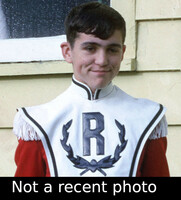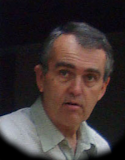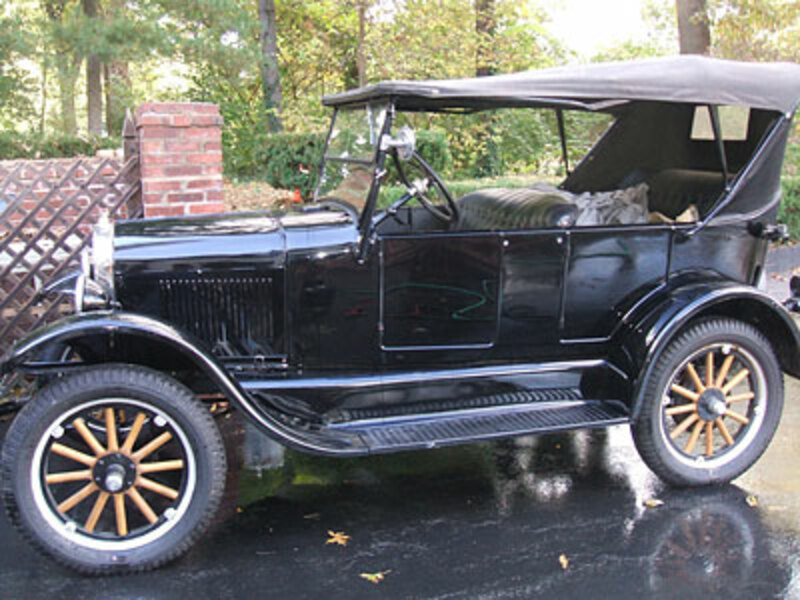Mom's Early Life
Category: FamilyDate: 2010-11-28
My mom, LaRue McGuire, was born LaRue Dorothy Henkel on October 26, 1916. At 94, she can still tell a good story. Recently, she suggested to me that we record some of her memories. As she said, "Other folks might be interested in how life was back when."
The text which follows is a pretty direct transcription of the stories she told in a recording we made on November 13, 2010. You can also listen to the audio file. There's more to come. Stay tuned!
LaRue's Story
I'll start with my folks. They were married in Centralia on May 21, 1910, at the Centralia Hotel. It was quite a building then and I think it still stands. I think its probably an antique shop now. They lived at Galvin, that's a small town outside of Centralia.
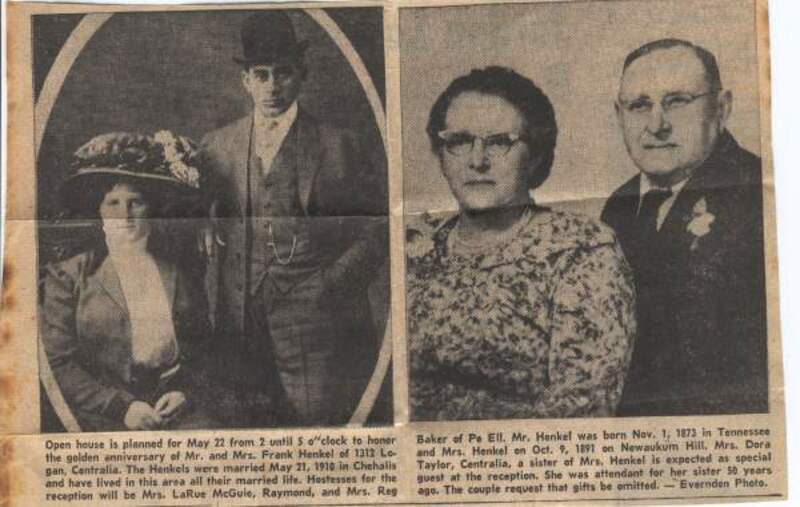
Frank and Elsie Henkel. A Newspaper clipping from 1960, announcing their 50th wedding anniversary
There was a mill there, and of course my dad worked there. Then they moved to British Columbia. You know, at that time, the people moved to where the timber was. I'm not quite sure, but I think my dad was just a saw filer there. I don't think he was a sawyer there, but at some mills he sawed lumber too. And they lived there until I was about 20 months old. Then they moved back to Centralia. My sister, Bernice, was born in Centralia on February 19, 1919. It was high water then and the town was pretty well flooded.
Shortly after Bernice was born, the folks moved to a little community on the highway going to Pe Ell, called Meskill. I was told from my mother, that they had a power plant there that produced electricity. So if you wanted to iron with an electric iron, you had to iron when the mill was closed down. I think they lived there for about a year, and then my dad went into partners with a man named George Peer. At that time they moved to a little community called Hopdale. I really only remember two things about living there. There was the Milwaukee Railroad that ran on the side where Hopdale was, and the NP (Northern Pacific) ran on the other side of the river. We would walk out the the railroad to catch the train to Chehalis. They would buy a little lamb and raise it on the bottle. The men at the mill teased that little lamb, rubbing its head until it would run and butt things over. I would just get up, and here come that lamb and knock me over. I think I'd finally have to cry and for mother to come help me up. The lamb thought that was fun to knock me over.
Next they moved, you might say, just across the river. It was up the road a little bit towards Pe Ell, but across the river. They had to build quite a bridge to go across the river. It was heavy-built but a one-way traffic bridge. I remember one time my mother sent me to Mrs. Peer's for some reason, and I was on that bridge when the mill truck came back. I guess I about panicked! The man told my mother that he thought I was going to jump in the river! They had a cookhouse there and three camp houses, and bunkhouses for the men to stay in. I remember that the lady's name who cooked was Mrs. Brigham. Quite often she'd come up in the morning after she'd had breakfast and visit for a little while with my mother. So my mom was out feeding the chickens – they had chickens out back. I heard a knock come at the door, and of course I thought it was Mrs. Brigham. So I hollered “Come in!” and some man opened the door! We had tramps that came along the railroad and they'd stop and beg for food. And that was one of them. I ran back and jumped in my bed, as if that would help! I can remember that there was only one of those men who came by that my mom said she was kind of afraid of. He said, 'I'm so hungry I'm desperate!” But they'd also take the bucket from the well. My mother accused them of getting a chicken out of the chicken yard, and boil a chicken in the bucket. I can hear her say, “Oh those darn guys, they stole another bucket!”
I can remember another time, my folks and all of us went into Chehalis to see a movie. We came back late, I don't know what time it was, but it was dark. There was blood all over the porch. My mother traced it into the closet where she kept dirty clothes. She said the cat must have got into a fight. The next morning, she found the cat but it had no tail! She said, “I didn't know that those tomcats could fight that hard!” Anyway, the next morning her brother came, and he said, “Elsie! Here's your cat's tail.” The cat had come that close to getting run over on the railroad. It just lost its tail on the railroad! O yes, the kitty lived, that spot healed up on his back and he just lived without a tail.
My mother's dad would come sometimes to help with something or spade the garden there. He would come with a horse and buggy. I've thought of it since, what a trip that was. From Centralia out there, it would have been probably 25 miles. I was down there with him when he was spading the garden. He was picking out worms to go fishing with. He wanted me to pick the worms up, and I wouldn't do it. He'd just say, “You know those worm's aren't going to hurt you”.
The mill was across the railroad tracks from the house. You had to walk up a plank and across the railroad to get to the mill. I've had some people tell me this is wrong, but I saw it; I know I did. I met a lizard coming down that walk. I scared it. It lost its tail, and away it went. I heard afterward, that they'd come back and pick their tail up. Whether they ever did or not, I don't know.
I liked to go to the mill when my dad was just down there working and the mill wasn't running, so my mother would let me go. She'd clean me up to go down there. I remember I had white tennis shoes on, and a blue and white dress with a white collar on it. I saw some buttercups down there, and I thought I'd pick my mother a bouquet. Well I stepped on the ground. It was just coated over – it looked like it was hard, but it was soft – and down I went with one foot. I couldn't pull that out and down I went with two feet. I tried to pull and pull and I couldn't get out. Finally I was down there with two feet and two hands in that mud. I kept hollering and I thought “Oh my dad won't hear me!”
But he said, “Where are you girl?”
“I'm down here stuck in the mud!”
And he said, “Oh dear, wait till your mother sees you!” Huh!
That mud just stunk something terrible. He took a stick and scraped me off as best he could, but my mom just could never get those tennis shoes white. That mud just made them awful colored.
The mill burned while we were there, and they rebuilt it. I don't know how long it was then before our house burned, but our house burned in February, 1923. There was snow on the ground, and we had been out playing in the snow. Our shoes were off drying by the stove, and we had house slippers on. My dad was reading the newspaper and he looked up and said, “Oh girls! Get outside! The house is on fire!” Well I stood outside screaming. I said, “Oh my teddy bear! My bed!”
We didn't have a chimney. We just had a stovepipe, and my dad said he was sure the stovepipe came apart in the attic. And the house was built all out of cedar, so you know it went real quick. My mother had washed clothes that day, so what clothes were on the line were saved. And the stand table that we gave you (Duane) went out the door. I think that was about all!
We went to town the next day to get clothes and stuff. A few days after that, the neighbors who lived – oh quite a ways away – gave my mother a shower. And that was when I learned there was no Santa Claus. The older girls were talking, and you know we just had Christmas – this was February. They said, “You know, there is no Santa Claus.” I think I spoke up and said, “Oh yes there is!” They said, “No there isn't, it's just your aunts and your uncles”. I was quite put out. I remember asking my mother and she said, “ Well … yes, that's just a game that we all play.” But I was quite disappointed, to hear that there was no Santa Claus.
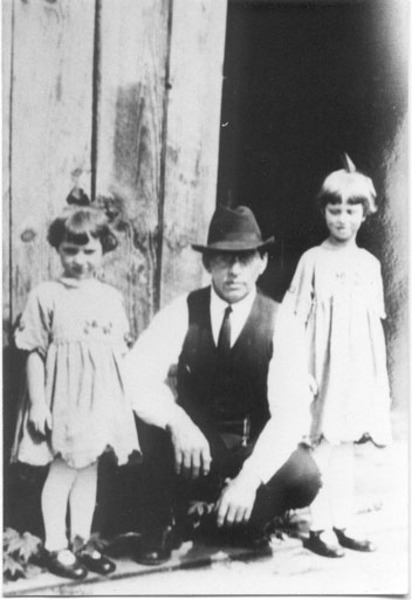
Frank Henkel and his girls, Bernice and LaRue, circa 1923
That was February 1923, and I don't know just when, but they bought timber out in Pleasant Valley area out of Chehalis. So my dad went back and forth there to build the mill. They built a mill and dug a mill pond, and built a railroad to get the timber out of the woods. They had a locomotive, and I don't remember of course, how many cars they had behind to put the logs on. They had a slip that they pulled the logs on up into the mill. There was a creek that they dammed up to make the water for the pond. I can remember laying on that board and watching the fish jump over the edge.
I don't know if my mother knew what kind of games we played down there at the mill, but that was one of them. Another one was to climb up the conveyor and look over the edge into the fire pit. Another one we used to play … there was a machine they called the edger that they put timber through to edge it up, and some how it was fun to climb down in the hole where all that stuff went. We had stop and go signs all over the mill dock and we took our wagons up there. We'd play that one of us was the policeman and others were drivers. And the policeman would give them tickets. There were little carts that they put lumber on. I remember that we got one of those and it got away from us and it went over the edge and down on the ground, and off of the dock. Somebody had to pick it up! But it wasn't me who picked it up. We didn't have anybody on it, thank goodness! We were just pushing the thing to see it go. There was a fork in the dock where you could go straight or take a turn and go out on another dock. Of course it was fun to go that way. We'd play on the lumber pile, too, and climb where they had stickers between it to dry it. Anyway, we never really got hurt. Maybe we got skinned once in a while. It was a wonderful place to play.
They had a horse when we moved there, and I guess they used the horse somehow with a plow or something to build the dam for the pond. It's too bad I didn't ask more questions.
I think I heard my dad say they could cut about 25,000 board feet of lumber a day. It was a pretty good sized mill. It was bigger than the others that we had.
The creek was the prettiest little thing. It run down on quite level ground. I remember that's where I found my rock, that I call my pretty rock. Also there was the biggest snake I ever saw in my life sunning itself down there by the creek. Of course, I didn't stay long when I saw the snake. It's down there where I did my first fishing. My dad fixed me up a fishing pole. It was nothing more than a twig out of the trees and a string and a hook on the end. I must have really hooked this guy, because I didn't want to take him off my hook. He was all slippery and slimy. I came all the way through the bushes with the fish on the hook. My dad said, “You're quite a fisherman!”
My mother had quite a flower garden there. We didn't have a vegetable garden, but there was quite a flower garden. The people they had bought the timber from and they leased the ground from was so good to all of us. They had an orchard and any of us could go up there and get all the fruit we wanted. We used to get milk up there. At that time you had lard buckets that had lids on. My dad fixed a stick with notches in so that the men would carry two gallons on each stick. So there was enough for four people to get a gallon of milk. So we had lots of milk and lots of cream. Lots of fruit and lots of vegetables. The farm up there provided us with all that. They had quite a modern barn for that day and age. They had milking machines and a room that they called their milk room. They had a cooler in there where the cold water ran over and then the milk run in between … oh I don't know … some way in between. I can remember standing there watching it.
That was three old bachelors and one old maid. They all made money in Alaska and then came down there and invested their money in that farm.
We moved to Mossyrock in '31 or '32. '32, I guess, because I went [to school there] for three years '32, '33, and '34. In '32 we lived at what they called Ajlune, when we first moved there. That's all under water now because of the dams they built up there. It's not existing any more. Ajlune was close to the mill that my dad worked in. We lived there a year. That house sat up on a hill and it had quite a storage area under the house. It had two bedrooms, a kitchen and a living room. My mother thought she was just kind of camping up there. When we just started out we had a kerosene cookstove. I think it had three burners and an oven on it. It was alright, but it smelled like kerosene. Anyway she finally decided she had to have her cookstove, so they moved the cookstove there. I rode the bus from Ajlune in to Mossyrock. Harvey lived at Rife, but I didn't know him then. That's maybe about seven or eight miles above Ajlune. While we lived there at Ajlune, my dad decided that us girls should go to the dance. I'm too sure but what he wanted to go too! But anyway we started going to the dances in Chehalis at the Moose Hall. They'd buy groceries. The grocery store would stay open 'til 9, and then we'd go to the dance. So that's where I met your dad [Harvey].
Then we moved to Mossyrock, where we lived for two years in a house almost across the street from the high school.
Now when we moved from Mossyrock, my grandpa had property out of Chehalis. I don't remember if my mother ever got any benefit from it. I think by the time she paid the bills it was all used up. But there were three places that he owned out there. We first moved into one of those little places. It was close to the Skookumchuck River in Centralia. We lived there about three or four months, but my mother decided she was going to have something different, so she went out looking and found a place in Centralia. It was a 3 bedroom house with a kitchen, dining room and living room, with single walls and single floors, but it was pretty good when we'd had what we had had. They bought it for $500. Nothing down and five dollars a month. Isn't that something!
Back in 1926, my folks bought their new car. It was a 1926 Model T. My dad had a Rutzel gear installed in it. He said that would go up over the mountains better. We took a trip to Tennessee to see his folks. We left Chehalis, and I think we were on the road about 10 days, stayed there 10 days, and then 10 days back. We had a good time. It was nice weather all the time we were gone, except it was sure hot in Tennessee.
1926 Model T Ford Touring Car
When we got to where my dad's father lived, there were children out in the yard playing all over. If I remember right, that one family had ten children, and the other one had six. So their children would make quite a yard full! Anyway, my dad had little calling cards made up with his name on them. He handed one to a boy that was probably thirteen or fourteen and said, “Go in and see if your mother knows anything about this fella.” I can hear him yet. “Oh! ” he says, “I know! I know she knows him!” And off he went. They came out and invited us in. The grandpa just lived in the bedroom and we went in there where he was. He didn't talk anything but German. My dad had maintained to us kids that he didn't remember no German, but he talked German just as good as Grandpa did! He said to him, “You're going to get up out of that bed tomorrow, and we're going for a ride!” So he did. He got him up out of bed and everyday they went for a ride. We went someplace everyday. When we left, he went back to bed again and stayed there until he died.
My uncle Joe thought we ought to go down to let's see … it would be Alabama? That's where the dam was, and that's one little trip we took while we were there. My dad had three sisters there [in Tennessee] and a brother in St. Louis. My mother just insisted that we stop in St. Louis and see him. He wasn't like my dad. He was just a little tiny fella and didn't have much to say, but we had dinner with him, I remember that.
My mother was so curious, because she'd heard my dad had a sweetheart back there named Kate. So she wanted to meet Kate. She asked Aunt Annie about it. Aunt Annie said, “Just leave it to me. I'll get Tony to take me out there.” They called my dad “Tony” but we knew him by the name of “Frank”.
Anyway she said to him, “You know Tony, I just haven't seen Kate for so long, I'd sure like to go out there.” He said, “OK, let's go!” Well I wanted to go, but they wouldn't let us kids go. Anyway, Momma met the old sweetheart. My dad's brother ended up marrying Kate. But my dad said, “Well the darn fool! He ought to have known better than that! You'd go out there. They'd have a fight and a frying pan would come flying out the door. That's the kind of people they were!”
Coming back, we had a car wreck on the road in Denver. It wasn't my dad's fault. Somebody came out of the side road and didn't stop. So we had to stay a couple days in Denver until they repaired the car. I think it was that same fall in Chehalis when my mother was driving the car and the train hit her. She had stopped at the train light and one train had passed and she didn't see the other one coming. The train hit us, and of course you know we didn't have no seat belts. All three of us were sitting in the front seat, with Bernice in the middle and I on the outside. We'd been to the service station and he'd given each of us kids pencils. I remember I had that in my hand so tight they had to pry it loose to get it loose. Anyway, the door came open and I could see the train wheels rollin' around. That's how close it came to me being under the train. It wasn't a very good experience, but we made out alright.
2025 2024 2023 2022 2021 2020 2019 2018 2017 2016 2015 2014 2013 2012 2011 2010 2009 2008 2007 2006 2005 2004
Comments
I welcome your comments. You do NOT need to sign in to leave a comment. If you create an account and sign in, my comment system will notify you of replies to your comment. Thanks for stopping by.--Duane McGuire
